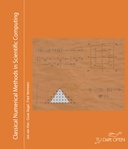Explore

Classical Numerical Methods in Scientific Computing
Jos van Kan, Guus Segal, Fred Vermolen
2023
0 Ungluers have
Faved this Work
Login to Fave
Partial differential equations are paramount in mathematical modelling with applications in engineering and science. The book starts with a crash course on partial differential equations in order to familiarize the reader with fundamental properties such as existence, uniqueness and possibly existing maximum principles. The main topic of the book entails the description of classical numerical methods that are used to approximate the solution of partial differential equations. The focus is on discretization methods such as the finite difference, finite volume and finite element method. The manuscript also makes a short excursion to the solution of large sets of (non)linear algebraic equations that result after application of discretization method to partial differential equations. The book treats the construction of such discretization methods, as well as some error analysis, where it is noted that the error analysis for the finite element method is merely descriptive, rather than rigorous from a mathematical point of view. The last chapters focus on time integration issues for classical time-dependent partial differential equations. After reading the book, the reader should be able to derive finite element methods, to implement the methods and to judge whether the obtained approximations are consistent with the solution to the partial differential equations. The reader will also obtain these skills for the other classical discretization methods. Acquiring such fundamental knowledge will allow the reader to continue studying more advanced methods like meshfree methods, discontinuous Galerkin methods and spectral methods for the approximation of solutions to partial differential equations.
This book is included in DOAB.
Why read this book? Have your say.
You must be logged in to comment.
Editions

